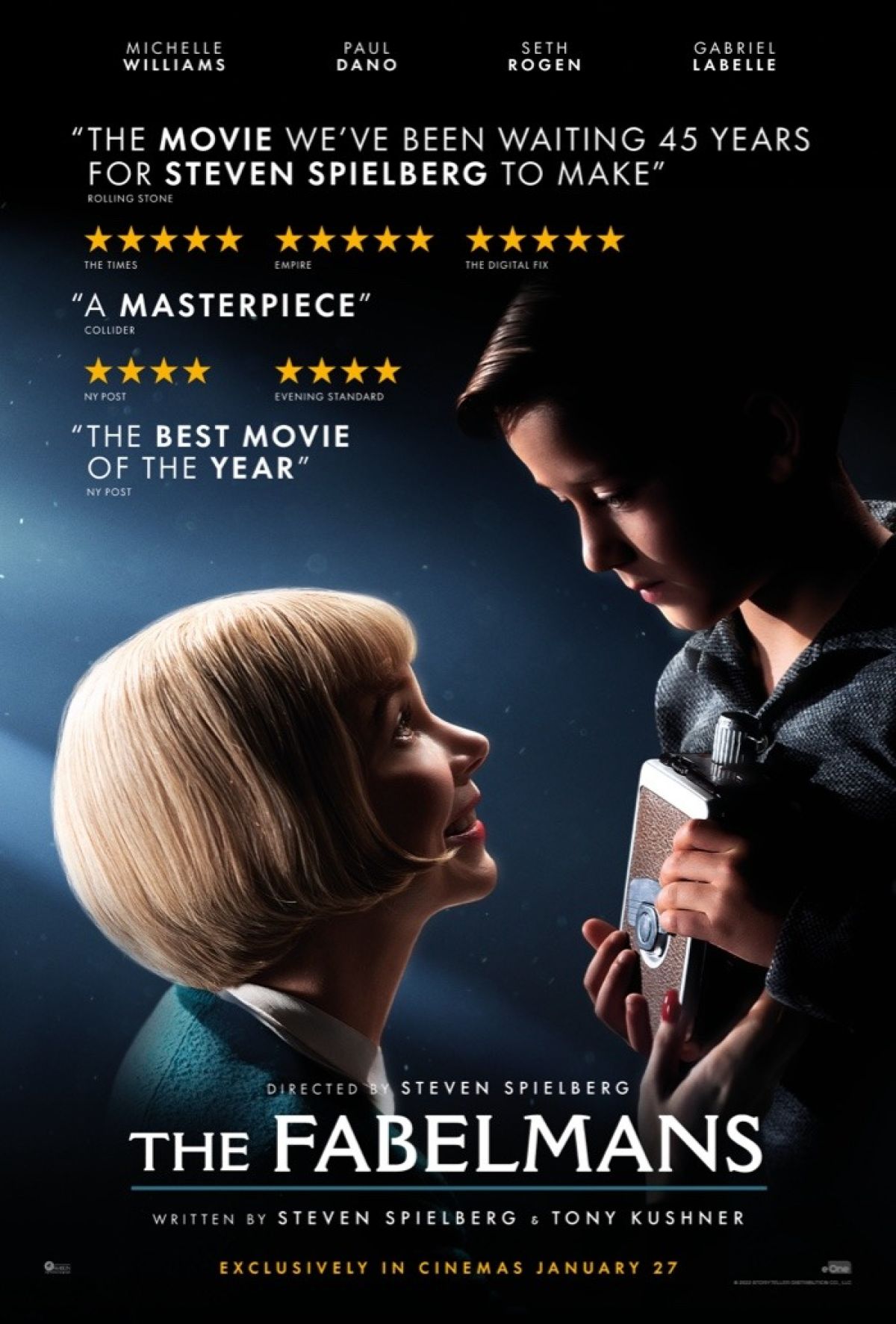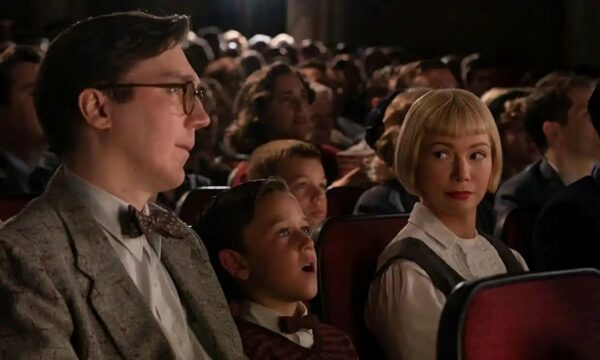The Fabelmans review: An ode to the power of the motion picture
By Joe McFadden

Steven Spielberg is often cited as the greatest filmmaker alive – or one of them, at least. With a career spanning almost 60 years and 34 feature films – as well as being the most commercially successful director of all time – no one can deny that Spielberg is one of the greats: a living legend from an era that’s all but faded into myth.
His latest film, a semi-autobiographical drama called The Fabelmans, is an ode to the power of the motion picture; a slightly self-indulgent, two-and-a-half hour love letter to the movies which inspired Spielberg and a loving, yet critical, tribute to the family that got him there.
The Fabelmans follows Sammy Fabelman (Gabriel LaBelle), a young boy growing up in a Jewish household who becomes enthralled with cinema and aspires to make a career out of it. As we follow Sammy we see how he evolves from a frightened child to a gifted adolescent, all the way from a small boy in New Jersey captivated by the train crash in Cecil B. DeMille’s 1952 epic The Greatest Show on Earth to a high school senior filming a school away day.
However, it’s the quiet moments of family drama in-between these bookends that really shine. Spielberg’s fictionalised family consists of his father, the loving yet stern Burt (the always terrific Paul Dano); his mother, an artist with a tortured soul (a brilliant turn by Michelle Williams); “Uncle” Bennie (a notably restrained Seth Rogen); and sisters Reggie, Natalie, and Lisa (with Reggie played by Once upon a time in Hollywood breakout star Julia Butters). Judd Hirsch steals the show as Sammy’s eccentric great uncle Boris in an unrelenting performance designed to remind Sammy – and the audience – of why art is important.
Michelle Williams is a revelation
Throughout the film, we witness how Sammy’s interactions with his family come to define who he is. Indeed, like any family, the Fabelmans are a complicated bunch. Despite loving his son, Burt can’t fathom the fact that Sammy sees making movies as more than a hobby and not something Bert believes will be discarded once algebra finals and college applications come around and life becomes a lot bigger.
Michelle Williams is a revelation as Sammy’s mother, Mitzi. A talented piano player, she’s the artistic anchor of the family and the person Sammy feels closest to, but she has her own struggles that create the emotional tension at the heart of the film. Mitzi’s depression is portrayed in a nuanced and sympathetic way.
Her struggles don’t come in big, dramatic moments – minus a hilarious sequence where she buys a monkey (played by the same primate thespian who portrayed Annie’s Boobs in Community) – but are subtle, seen in the background through Williams’ fantastic, multi-layered performance as a woman who wishes things were one way but can’t help the fact that they’re the other way.
It’s the subtle portrait of family drama with a small ‘d’ which makes The Fabelmans click. Spielberg has always been a master at bringing out the emotional side of characters in a way that feels real. Take, for example, any of the moments shared between E.T and Elliott or Liam Neeson’s haunting monologue in Schindler’s List. Spielberg excels at extracting real emotions out of his actors, not in big outbursts or spectacular set pieces (although he excels at these too) but in the pain and pathos brought out by love, frustration, admiration, and all those other emotions which make us human.
Ultimately though, The Fabelmans is a movie about the motion picture and it’s in this department where Spielberg’s talents as a filmmaker prove why he’s still one of the greats. Anyone who’s ever wanted to be a filmmaker will find some degree of a kindred spirit in Sammy. Gabriel LaBelle is perfect as the semi-fictional Spielberg. His body language, mannerisms, and facial expressions all convey the dreamlike wonder Sammy walks around with, and, much like the real Spielberg, he truly comes alive when talking about movies.
One of the film’s best sequences comes when Sammy is directing his “Ditch Day” film, set to James Darren’s ‘Goodbye Cruel World’. The passion and care for his craft Sammy expresses makes this scene enthralling to watch but also serves as a showcase for Spielberg’s talents behind the camera.

There is no filmmaker – alive or dead – who moves their camera the same way Steven Spielberg does. Martin Scorsese is worthy of this honour too, but for completely different reasons. Even such simple scenes as opening a letter, sitting in a hallway, or making tea are filled with motion and energy. It’s hard to vocalise because it’s one of the few things that makes cinema, well, cinema, but Spielberg’s camera is never still, not even when it looks stationary.
Towards the end of the film, a very important cameo which I won’t spoil gives some advice to a young Sammy: “When the horizon’s at the bottom, it’s interesting; when the horizon’s at the top, it’s interesting; when the horizon’s in the middle, it’s boring as shit!” Spielberg’s camerawork is never boring, always finding the intricacies and subtle details in whatever his lens is viewing.
art and imagination are the most powerful tools in a world which increasingly values neither
Unfortunately, there are points when the film does lag and can be almost too self-indulgent. Spielberg and co-writer Tony Kushner sometimes spend too long covering the same ground, repeating family feuds when more time could be spent with Sammy absorbing cinema instead of just talking about it.
At times, the film lacks a connective tissue that prevents it from being a truly great picture (although this does not majorly detract from the overall experience). The Fabelmans can’t quite live up to the same awe-inspiring moments which drive Sammy to fulfil his dreams or achieve the same sense of wonder which permeated Spielberg’s early films, but what the film does do is act as a reminder of why movies matter and why art and imagination are the most powerful tools in a world which increasingly values neither.
Before the film began, a message from Spielberg was played thanking the audience for seeing the director’s most personal picture the way it was meant to be seen – in a cinema. Tragically, there were probably only about 10 people (including me and my Mum) at the screening. Granted, this was at 4.30pm on a Friday afternoon at a commercial cinema but I can’t imagine those numbers increased much in the evening or will drastically improve over the coming weeks.
The slow death of prestige cinema is killing the industry. It’s a great shame, and almost criminal that most people will experience Spielberg’s visceral camerawork, Janusz Kamiński’s eye-catching cinematography, and John Williams’ magnificent score on a small box in the corner of a room, watched through stolen glances and competing with never-ending text messages and a bottomless Instagram feed.
The Fabelmans is not Spielberg’s best film, nor is it the best film about filmmaking. It is, however, one of Spielberg’s best films in years and, most of all, it is a testament to the transformative power of cinema and the effect it can have on a young person’s life. Alongside George Lucas, Spielberg inadvertently birthed the blockbuster way back in New Hollywood and changed cinema forever. With The Fabelmans, Spielberg has once again shown the world why movies matter. They matter not because of connected universes or multimedia franchises but because of the awe a moving picture can inspire – even one as simple as watching a toy train crash over and over again.
5/5.
The Fabelmans is playing in U.K. cinemas now.







